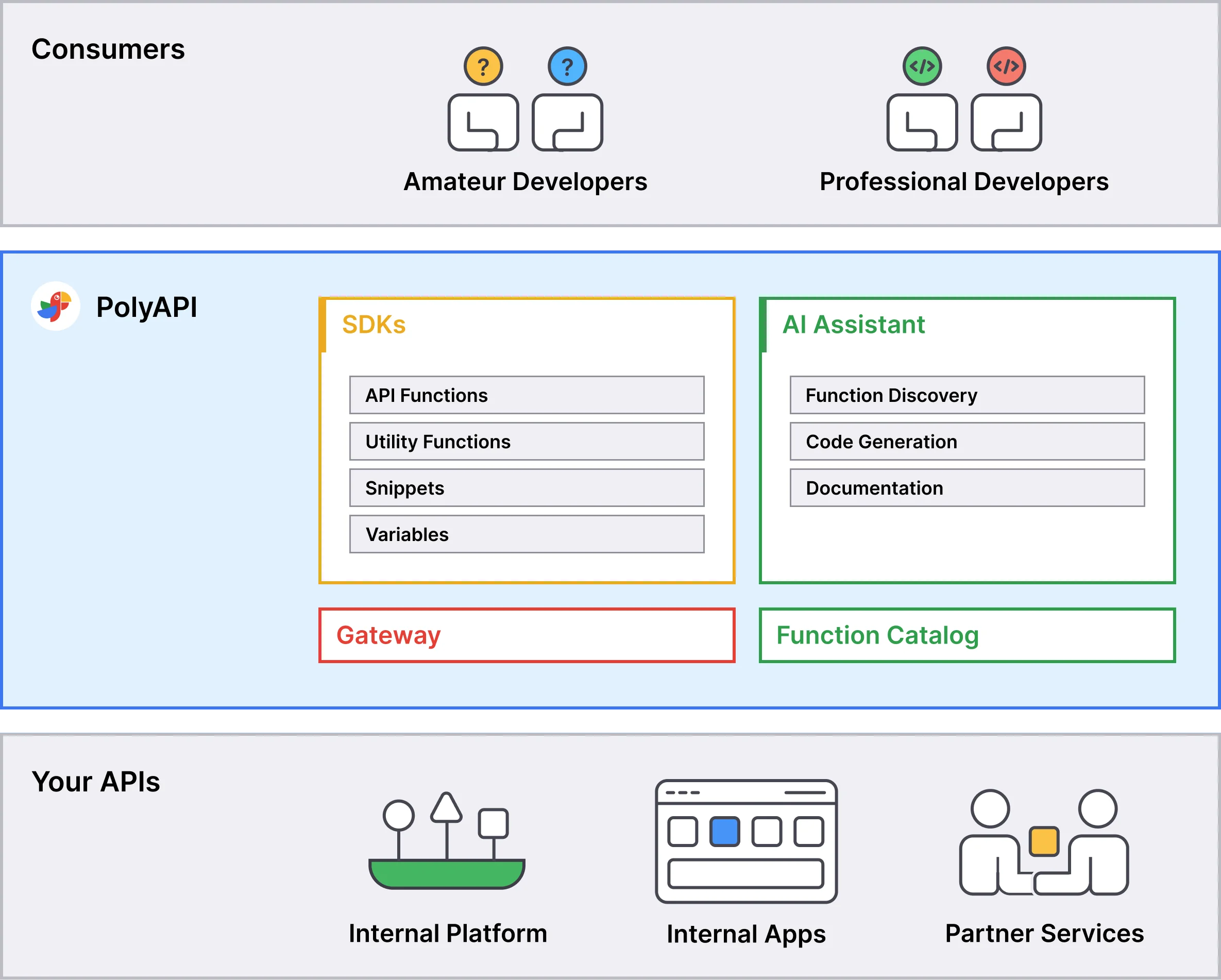
Listen to this article. Also available on Spotify. Subscribe to PolyAPI Squawk.
Partner enablement is all about accelerating your business growth by making it easier for partners (and customers) to integrate with your services. Perhaps you’ve already exposed APIs, but adoption is slower than expected for several reasons: your integration consumers vary widely in both development skill and domain knowledge, and they often need substantial guidance to use your APIs correctly. When poor implementations occur, the blame tends to fall on your API design or documentation—sometimes fairly, other times unfairly. These challenges not only strain your resources but also slow down momentum. Now, you’re looking for a solution that simplifies API consumption, reduces the need for hand-holding, and empowers partners to confidently build on your services—ultimately driving stronger business results. PolyAPI is here to help.
Key Objectives
Every business has unique circumstances, but we’ve noticed that organizations looking to improve their API consumption experience tend to share common goals. Typically, these goals include:
- Better Integrations
Ensuring that developers follow best practices and correct workflows so integrations are less prone to failures and require minimal production support. - Faster Integrations
Speeding up the development and launch of integrations. This not only reduces costs for partners, but also serves as a strong reference for bringing more partners and customers on board. - Lower Support Costs
Increasing self-sufficiency among users—especially those with limited development or domain expertise—frees your team to focus on higher-value initiatives rather than day-to-day support. - Lower Development Costs
You may already offer a robust integration experience through extensive documentation, SDKs, tutorials, and other resources. Now, you want a platform or product that maintains—or improves—this experience with less manual effort.
If one or more of these objectives resonate with you, keep reading to learn how Poly can help.
How PolyAPI Helps
PolyAPI provides three core capabilities to support partner enablement: SDKs, Gateway, and AI Assistant. Each capability comes loaded with features outlined in the section below. But first, let’s cover the basic concept.
Here’s a high-level diagram illustrating these capabilities:

At the heart of the system is the Function Catalog—a structured database of primitives that creates a seamless experience for client developers. This catalog powers all three components: the SDKs are generated directly from it, the AI Assistant taps into it for knowledge, and the Gateway uses it to execute runtime calls.
The Function Catalog comprises three classes of APIs: your internal platform APIs offered to partners and customers, internal application APIs that you have developed or purchased, and partner APIs that are important to your ecosystem. This unified set of capabilities can be tailored using our environments model, ensuring that not all APIs are exposed to every consumer, but rather customized function catalogs can be created for different groups.
Below, we outline the key features of each component and the value they bring to both amateur and professional developers—all managed through the Function Catalog and the corresponding Poly management service (UI and API).
SDKs:
API Functions
Language-specific interfaces for API operations organized into contexts (namespaces) with defined, typed signatures.
- Amateurs: Clear organization and auto-generated documentation for confident API calls.
- Professionals: Strict typing and modularity for advanced customization, debugging, and integration.
Type Schemas
Models defining arguments and response types for all functions, facilitating smoother integration.
- Amateurs: Clear input/output expectations that ease the learning curve.
- Professionals: Robust type-checking and enforced consistency across codebases.
Webhook Handlers
Functions that establish a websocket connection between the client and the Poly server, delivering real-time events (including headers and URL parameters).
- Amateurs: Simplified setup for receiving live updates without deep protocol knowledge.
- Professionals: Flexible foundation for sophisticated event-driven architectures and custom data processing.
Utility Functions
Executable functions within the SDK that perform common tasks.
- Amateurs: Simplify routine tasks and offer ready-to-use functionality.
- Professionals: Reduce development time with accessible starting points and modifiable underlying code.
Config Variables
Functions for accessing configurations such as URLs, example objects, and references, streamlining code integration.
- Amateurs: Provide direct, uncomplicated access to necessary settings.
- Professionals: Enable modeling and management of environment variables directly in code, simplifying deployment.
Secret Variables
Functions for handling sensitive data securely; developers can use these values in Poly functions without direct access.
- Amateurs: Securely manage sensitive information with minimal security overhead.
- Professionals: Integrate environment-specific sensitive data seamlessly without separate secret management.
Snippets
Blocks of non-compilable code that demonstrate patterns and examples, loaded live from the server.
- Amateurs: Offer practical guides to jump-start development and illustrate common use cases.
- Professionals: Serve as quick references and inspiration for best practices.
Error Handler Module
A module within generated SDKs that listens for events, enabling integrated or separate error monitoring.
- Amateurs: Simplifies error resolution with built-in handling solutions.
- Professionals: Provides customizable error management for complex, production-level systems.
SDK Generation and Distribution
SDKs can be generated on the fly by client developers or built and distributed by you, tailored to your needs. Our SDKs natively support four core languages: JavaScript (npm), Python (PyPI), Java (Maven), and C# (NuGet). SDK generation allows filtering down to only the required contexts or even individual functions, keeping the SDK minimal. This flexibility supports use case-specific SDKs even with a large catalog. Additionally, a VS Code extension (with potential support for other IDEs) lets developers explore the full function tree and quickly copy the needed interface or code.
Gateway
The Gateway serves as the central execution and event management layer, providing a unified interface for all API and server function interactions.
Execute Endpoints
Every API and server function is accessible via common execute endpoints. This endpoint accepts a standardized payload with the necessary arguments and uses a cached function catalog to translate and execute the underlying API call. The result is a unified API experience across diverse systems, which also simplifies the process of generating new SDKs—even when supporting various APIs with different interfaces. Although developers typically won’t interact directly with this endpoint, it can be used in scenarios involving unsupported languages or non-development systems like low/no-code platforms, Sheets, or Excel.
Event Handling
The Gateway continuously listens for inbound events, such as webhook notifications and scheduled job triggers. Soon, it will also support Kafka and GraphQL subscriptions. These events are routed to either client applications (via the SDK to maintain persistent connections) or server functions via triggers.
Logging
Native logging for API calls is available directly from the Gateway service. In future updates, these logs will be able to integrate with customer log analysis tools like Splunk.
Scaling
Managed by our Kubernetes service, the Gateway automatically scales based on load, ensuring reliable performance even during high-traffic periods.
Error Event Stream
The Gateway receives and normalizes error events. These errors can be delivered to client applications through the SDK or routed to server functions for further processing—such as triggering alerts, capturing logs, or creating incident reports.
Future Metering
While not available today, we plan to integrate with Revenium for metering. This integration will enable customers to monitor and bill user consumption through the Gateway, similar to our internal billing processes.
AI Assistant
Poly’s AI Assistant is available as a VS Code extension or integrated with GitHub Copilot Chat, ensuring seamless interaction with your development environment.
Function Discovery
The assistant connects to the function catalog through a multi-step process: it transforms the user’s prompt into a search query, retrieves and selects relevant functions (prioritizing recall), and then generates a personalized response with code examples. This approach helps users understand and apply functions effectively—the AI serves as the “offense” by providing insights, while the SDK acts as the “defense” by ensuring accuracy.
Documentation Support
The assistant can also query documentation. By using the /poly route, it searches our documentation and delivers answers. Additionally, customers can ingest their own documentation via an automated process, making it accessible under the /docs route for user support.
Code Generation
Tailored to the language you’re using, the assistant generates code examples to illustrate how to integrate Poly functions. Leveraging capabilities similar to OpenAI’s latest models, it also aids with general coding tasks like writing and debugging.
General Help
Beyond code, the AI Assistant taps into its broad knowledge base to generate realistic mock data, produce visually appealing demo objects, explain industry-specific concepts, and offer a range of other support functions.
Function Catalog
The Function Catalog—including its management services and UI—is not directly consumer-facing, but it equips you, the provider, with powerful capabilities.
Environment Management
Control domains or “sub-tenants” to tailor function access. For instance, you can configure a single environment for all users or create separate environments per customer, each with a curated set of functions, snippets, variables, etc. You can also publish functions universally or restrict them to specific environments based on your needs.
Access Provisioning
Manage keys, SSO access, and individual permissions. This allows you to designate roles—such as permitting some community members to manage snippets and utility functions, while others can only generate SDKs and use functions. You can also enable special customers to develop their own functions or add custom variables, with the source code residing in your Poly instance.
Function, Variable, and Snippet Management & Execution:
Every primitive is cataloged and visible. The management and ingestion process may vary by primitive, but all items are accessible within the catalog. For API functions and webhooks, you can trigger them via the UI for streamlined testing and validation.
Log Viewing
Access and collect runtime artifacts through native logs, available via the API, to monitor function performance and troubleshoot as needed.
Out-of-Box Functions:
Poly comes with a pre-trained, constantly growing catalog of thousands of functions. These functions can be hidden via configuration and further enhanced with your own custom functions.
How Poly is Different from the Market Alternatives
Poly takes a fundamentally different approach compared to other solutions in the market:
Native Alignment with Development Practices
Poly is built for common languages—TypeScript, Python, Java, and C#—and integrates seamlessly with popular IDEs like VS Code and IntelliJ. This ensures that our CLI tools and generated files work naturally with your existing development workflow.
Database-Driven Function Catalog
Unlike services that rely solely on OpenAPI specs or file-based approaches, Poly uses a database-driven catalog. This enables management and integration across multiple APIs, allowing you to combine functions from various providers into one unified SDK.
On-Demand SDK Generation
Poly’s SDKs are generated on demand, ensuring you always access the freshest content from the catalog. Unlike traditional versioned SDKs that require periodic updates, our approach automatically reflects the latest functions and improvements.
Granular Consumer Access
Our design allows different consumers to access tailored subsets of functions. Client developers can further filter these subsets, ensuring each user or group receives only the functionality relevant to their needs.
Unified Gateway for API Calls
Instead of calling APIs directly, our SDKs route requests through a centralized gateway. This provides full visibility, reliable event delivery to clients, and the flexibility to update functions on the server side without requiring SDK upgrades.
Function-Centric Approach
We avoid traditional connectors by maintaining a comprehensive catalog of functions. This model supports greater flexibility and scalability in managing and consuming APIs.
Consistent AI Integration
Our AI Assistants operate from the same source of truth as our SDK generation, ensuring high accuracy in recommendations. Using context-based injection with AI Model APIs, our assistants can work with any provider’s model without being tied to pre-built embeddings.
Kubernetes-Native and Cloud-Agnostic
Poly is designed to run natively on Kubernetes, enabling full self-hosting in major cloud environments such as AWS, Azure, or GCP. This provides scalability, high availability, and deployment flexibility.
Try it Today
PolyAPI is a cutting-edge, developer-centric platform that simplifies partner integration through a unified, database-driven function catalog. With on-demand SDK generation for TypeScript, Python, Java, and C#, a centralized gateway that streamlines API calls and event handling, and seamless AI assistance built directly on our function catalog, PolyAPI is engineered to fit naturally into your existing workflow. Plus, being Kubernetes-native, it can be fully self-hosted on AWS, Azure, or GCP, ensuring scalability and flexibility for every environment.
Interested in transforming your API integration experience?
- Reach out: Email us at hello@polyapi.io
- Sign up: Try our platform by signing up here.
- Learn more: Book a time to meet with us in person.
